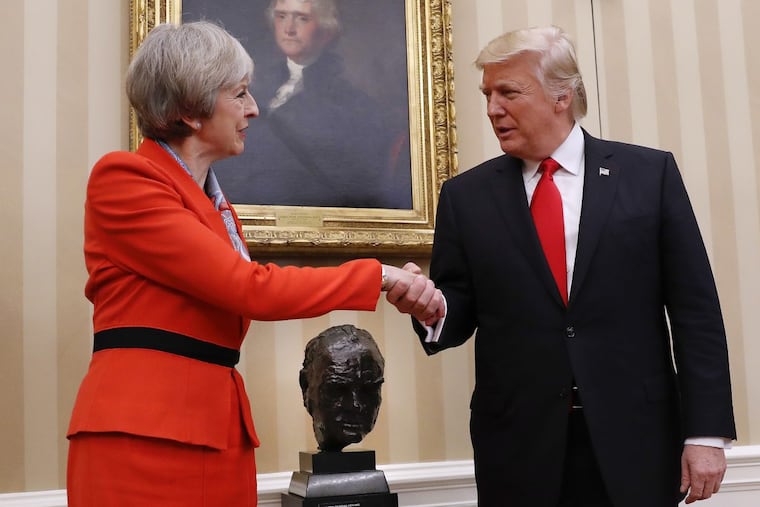Unless Trump backs Britain on poison case, Putin will think he's free to murder at will | Trudy Rubin
Theresa May needs U.S. and NATO support to push back against Kremlin murders on British soil.

In 2005, I interviewed a foreign leader who believed he had been poisoned by the Kremlin.
The newly elected Ukrainian President Viktor Yushchenko — hero of the Orange Revolution that defeated a candidate backed by Russia — nearly died after drinking soup laced with dioxin. His once-handsome face was discolored and pockmarked by the poison. Yushchenko told me the would-be assassin was his chef, who had fled to Moscow, where the Kremlin rejected any investigation.
Fast-forward to now. Britain just accused Russia of responsibility for the poisoning of an ex-spy, Sergei Skripal, and his daughter, who were found near death in the city of Salisbury. The poison used was a rare Soviet-era nerve agent, Novichuk, which is more lethal than sarin or VX; it was invented by Russian scientists for use against NATO troops. Moscow brazenly denies involvement.
This outrageous attack is the latest in a long string of killings or attempted murders of Kremlin opponents, many in Britain. Some victims were felled by other rare poisons traceable to Russia.
Prime Minister Theresa May has finally pushed back, stating the attack "represents an unlawful use of force by the Russian state against the United Kingdom." Britain has expelled 23 Russian diplomats and taken other punitive measures.
But May needs firm backing from NATO and Washington to confront Moscow's blatant attacks on British soil. What she needs most is strong, public support from President Trump.
So far the president is hewing to his never-criticize-Putin policy. Instead, Nikki Haley, the U.S. ambassador to the United Nations, made a tough speech Wednesday calling the poisoning "Russia's crime" and denouncing Moscow's use of chemical weapons.
But given the way this White House operates, no one can assume any cabinet official reflects the president's thinking. Unless Trump openly backs May, and endorses retaliation against Moscow, Putin will assume he can murder at will.
Consider the boldness of the attack on Skripal. He was a former double agent who worked secretly for British intelligence, was unmasked by Russia and imprisoned, then freed in a prisoner exchange in which the United States returned eight spies to Moscow. He lived quietly in Salisbury; in the old Cold War days exchanged spies weren't attacked by Moscow.
Times have changed. The Kremlin now seems determined to hunt down its opponents living in Britain and elsewhere. British experts believe professionals managed to expose Skripal to Novichuk, perhaps in a pub or a restaurant or his car, leading to muscle spasms and organ failure. A policeman and nearly two dozen civilians were also affected.
The Skripal attack revives memories of the 2006 death of Alexander Litvinenko, a Putin opponent and naturalized Briton; he died of polonium-210 poisoning in London. British authorities traced the source of this rare element to Russia. Again, the Kremlin denied all.
The British response to Litvinenko's death was cautious, which critics claim encouraged more murders. British authorities now intend to investigate 14 other suspicious deaths in Britain of Kremlin opponents.
Of course this doesn't touch on the use of poisons that have felled several domestic Kremlin opponents and journalists. Or the outright murder of political opposition activists such as Boris Nemtsov in front of the Kremlin's walls.
However, the Skripal affair is acutely important. It illustrates Putin's utter contempt for NATO and Western democracies. He is clearly testing, trying to show that post-Brexit Britain and NATO are too weak to counter such murders. Several NATO governments are now pro-Putin and unwilling to consider new economic sanctions.
No wonder Putin appears unworried about reprisals. Most important, he appears confident Trump will refuse to back May.
No doubt the Russian leader recalls Trump's shocking interview with Bill O'Reilly last year when O'Reilly snapped, "Putin's a killer." Trump retorted: "You got a lot of killers. … What, you think our country's so innocent?"
Candidate Trump made his feelings even clearer in December 2015 in an interview on Morning Joe. After an effusive round of Putin praise from Trump, Joe Scarborough noted the Russian leader was "also a person that kills journalists and political opponents and invades countries." Trump responded: "At least he's a leader."
That kind of thinking seems to underlie Trump's reluctance so far to join in May's strong critique of Russia over Skripal. When asked by journalists about the case, Trump waffled and refused to be drawn in. (Secretary of State Rex Tillerson took a much stronger stand on the case, giving heart to British officials, but that was just before he was fired.)
Putin respects strength. Trump's waffling will only convince the Russian he can pursue vendettas in the West with impunity. It will further fracture NATO and undercut relations with Britain. No wonder the Kremlin dismisses the Skripal case as "a circus show."
"They [the Kremlin] have treated the use of a military-grade nerve agent in Europe with sarcasm, contempt, and defiance," said May on Wednesday.
Does Donald Trump even care?
trubin@phillynews.com; @trudyrubin